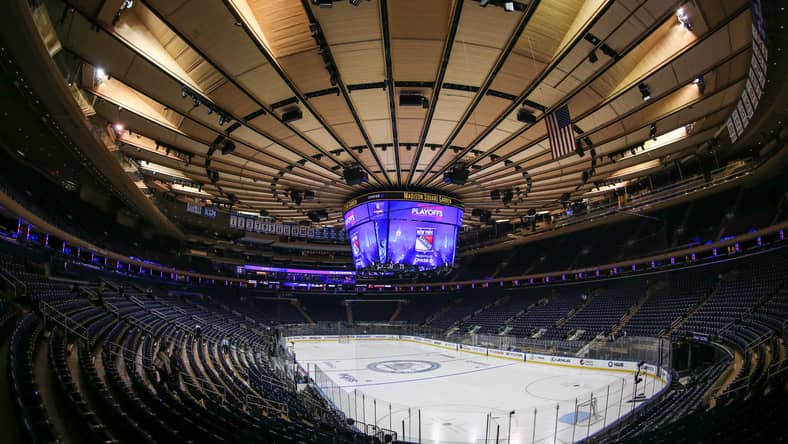Rangers Greatest Hits: Chuck Rayner wins Hart Trophy in 1949-50

Historically, before the 1949-50 season, only one netminder ever won the Hart Trophy as the NHL’s Most Valuable Player, with Roy Worters of the New York Americans claiming the award in 1928-29. He did so by skating in 36 games, compiling a 16-12-10 record while sporting an immaculate 1.15 goals-against average (GAA), becoming the sixth winner of the prestigious award.
Twenty-one years later, another goalie, Chuck Rayner, would be named NHL MVP despite posting a losing record of 28-30-11 in 69 contests. One of the significant reasons Rayner earned his place in hockey immortality was that he carried a mediocre New York Rangers team to double overtime of Game 7 of the Stanley Cup Final.
Although Rayner wasn’t the first player from the Rangers organization to win the Hart Trophy, that honor belongs to Buddy O’Connor (1947-48); he remains the only netminder in team history to win and is just one of seven goalies in NHL history to have their names inscribed on the award.
Considering that the Blueshirts have had just four Hart Trophy winners in their long history, we take a step back in time to revisit the year Rayner almost led the Rangers to a championship.
Related: Igor Shesterkin a Hart Trophy Finalist
Rayner can’t catch a break in the first two months of the 1949-50 season
Immediately out of the gate, Rayner lost his first start of the year against the Montreal Canadiens, 3-1, on Oct. 15, 1949. Over the next week and a half, he drove his record to 0-2-2 before picking up his first win against the Chicago Blackhawks on October 25. After winning (again) the following night against the Boston Bruins, he dropped his next two starts before alternating losses and ties for almost a month before his next win on November 16 against the Bruins.
Statistically, by the end of November, Rayner appeared in 19 games, earning a 5-8-6 record with a 2.89 GAA. Surprisingly, after so many struggles, he had his best month of the season in December, producing a 9-3-1 record in 13 games and achieving a 1.30 GAA during this stretch. Additionally, he compiled a four-game win streak from December 4 to December 11, shutting out the Blackhawks and Detroit Red Wings, finishing the month with another mini streak of three consecutive wins.
Heading into the New Year, Rayner had played every game for the Rangers up to this point and was responsible for the team’s 14-11-7 record after 32 contests. Despite his three shutouts and 2.25 GAA, New York lacked the offensive power to stay competitive, scoring the same number of goals (72) as against.
Rayner has a dismal start to the second half of the season

After rolling through December with minor hiccups, Rayner and the Rangers struggled in January, when their netminder only won three games, finishing the month with a 3-8-2 record and surrendering 33 goals, equalling a 2.53 GAA. Unfortunately, during this stretch, Rayner recorded a season-high seven-game losing streak that started on January 11 and lasted through the January 28 contest against the Bruins.
Although he had a bounce-back month in February with a 7-3-2 record, Rayner struggled to keep the puck out of the net, giving up 30 goals in 12 games for a 2.50 GAA. Statistically, heading into the final month of the regular season, he was scraping by with a 24-22-11 record and 2.36 GAA with six shutouts and six penalty minutes.
Unfortunately, the losses piled up again in March, where he finished the final 12 games of the year with a 4-8-0 record, including a six-game losing streak from March 11 to March 21. Luckily, he won the year’s final contest, securing a 5-3 win over the Toronto Maple Leafs on March 26. Ultimately, Rayner’s final statistics included appearing in 69 of 70 games, with a 28-30-11 record, six shutouts, and 2.62 GAA.
As the fourth seed heading into the playoffs, New York drew the Canadiens (second seed) in the opening round and almost swept their northern rivals but advanced with a 3-0 win in Game 5. After moving to the Stanley Cup Final in a thrilling seven-game victory over the Maple Leafs, the Red Wings and the Rangers had a series for the ages.
Initially, with Rayner backstopping them in every minute of the playoffs, the Rangers lost Game 1 and evened the series in Game 2 before falling behind again after a Game 3 defeat. Eventually, New York tied it again with a 4-3 overtime victory in Game 4 before getting to within one win of the championship with another overtime victory (2-1) in Game 5. However, their storybook ending never happened, as the Rangers lost Game 6 (5-4) before dropping the series finale in double overtime (4-3) on April 23.
During the playoffs, Rayner earned a 7-5 record in 12 appearances, playing 774:02, recording a shutout, 2.41 GAA, and going 2-2 in overtime contests.
Inside the numbers of Rayner’s historic season
Despite a losing record throughout the regular season, Rayner went 9-4-1 against the Blackhawks, the only team he produced a winning record against. Overall, he was 5-5-4 against the Bruins, 5-6-2 against the Red Wings, 5-7-2 against the Canadiens, and 4-8-2 against the Maple Leafs.
Furthermore, he had six shutouts that year, with two against Chicago, Detroit, and Montreal. Additionally, Rayner won more games on home ice (19-12-4) than he did on the road (9-18-7). Interestingly, he posted an impressive 1.36 GAA in 28 wins, with a 1.91 GAA in 11 ties; however, his GAA numbers ballooned up to 4.07 in losses.
As mentioned, he had two winning months in December and February, with his worst numbers coming in March. Statistically, Rayner won a career-high 28 games that year while dropping 30 contests for the third and final time. Even though he gave up 181 goals, the second-highest total during regular season play, his 2.62 GAA in 1949-50 remained his best.
What happened to Rayner after the 1949-50 season?
At 29 years old, Rayner came within a win of capturing the Stanley Cup but instead was voted the most valuable player for his efforts. Unfortunately, after suffering a knee injury, he was out of professional hockey within three seasons, suiting up for his last game in the NHL on Jan. 4, 1953.
Before his award-winning campaign, Rayner came into the season with a career record of 97-147-40, with 892 goals against (3.11 GAA) in 286 games. After winning the Hart Trophy, he played another 139 games, sporting a 41-60-38 record with a 2.88 GAA with 399 goals against.
Surprisingly, he never played in the playoffs again after that Game 7 loss in 1949-50, finishing his NHL career with a 9-9 record in the postseason, with an impressive 2.43 GAA and one shutout.
Rayner earned an induction into the Hockey Hall of Fame in 1973, becoming just the second netminder (at the time) to earn induction with a losing record, 138-207-78, with 25 shutouts. Besides additional accomplishments like Second All-Star Team honors in the AHL and NHL, plus playing in three All-Star Games, he was ranked as the 16th best Rangers player during the franchise’s first 82 seasons.
Some stats used via Hockey-Reference and NHL Records
More About:New York Rangers Features
